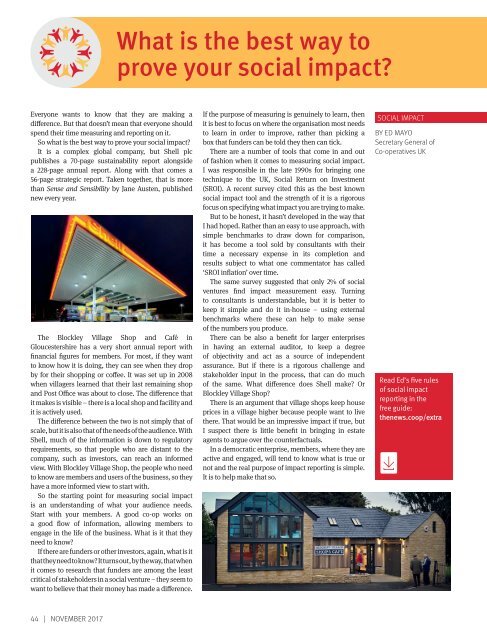November 2017
Create successful ePaper yourself
Turn your PDF publications into a flip-book with our unique Google optimized e-Paper software.
The co-ops What behind is the the best British way to brands...<br />
prove your social impact?<br />
Everyone wants to know that they are making a<br />
difference. But that doesn’t mean that everyone should<br />
spend their time measuring and reporting on it.<br />
So what is the best way to prove your social impact?<br />
It is a complex global company, but Shell plc<br />
publishes a 70-page sustainability report alongside<br />
a 228-page annual report. Along with that comes a<br />
56-page strategic report. Taken together, that is more<br />
than Sense and Sensibility by Jane Austen, published<br />
new every year.<br />
The Blockley Village Shop and Café in<br />
Gloucestershire has a very short annual report with<br />
financial figures for members. For most, if they want<br />
to know how it is doing, they can see when they drop<br />
by for their shopping or coffee. It was set up in 2008<br />
when villagers learned that their last remaining shop<br />
and Post Office was about to close. The difference that<br />
it makes is visible – there is a local shop and facility and<br />
it is actively used.<br />
The difference between the two is not simply that of<br />
scale, but it is also that of the needs of the audience. With<br />
Shell, much of the information is down to regulatory<br />
requirements, so that people who are distant to the<br />
company, such as investors, can reach an informed<br />
view. With Blockley Village Shop, the people who need<br />
to know are members and users of the business, so they<br />
have a more informed view to start with.<br />
So the starting point for measuring social impact<br />
is an understanding of what your audience needs.<br />
Start with your members. A good co-op works on<br />
a good flow of information, allowing members to<br />
engage in the life of the business. What is it that they<br />
need to know?<br />
If there are funders or other investors, again, what is it<br />
that they need to know? It turns out, by the way, that when<br />
it comes to research that funders are among the least<br />
critical of stakeholders in a social venture – they seem to<br />
want to believe that their money has made a difference.<br />
If the purpose of measuring is genuinely to learn, then<br />
it is best to focus on where the organisation most needs<br />
to learn in order to improve, rather than picking a<br />
box that funders can be told they then can tick.<br />
There are a number of tools that come in and out<br />
of fashion when it comes to measuring social impact.<br />
I was responsible in the late 1990s for bringing one<br />
technique to the UK, Social Return on Investment<br />
(SROI). A recent survey cited this as the best known<br />
social impact tool and the strength of it is a rigorous<br />
focus on specifying what impact you are trying to make.<br />
But to be honest, it hasn’t developed in the way that<br />
I had hoped. Rather than an easy to use approach, with<br />
simple benchmarks to draw down for comparison,<br />
it has become a tool sold by consultants with their<br />
time a necessary expense in its completion and<br />
results subject to what one commentator has called<br />
‘SROI inflation’ over time.<br />
The same survey suggested that only 2% of social<br />
ventures find impact measurement easy. Turning<br />
to consultants is understandable, but it is better to<br />
keep it simple and do it in-house – using external<br />
benchmarks where these can help to make sense<br />
of the numbers you produce.<br />
There can be also a benefit for larger enterprises<br />
in having an external auditor, to keep a degree<br />
of objectivity and act as a source of independent<br />
assurance. But if there is a rigorous challenge and<br />
stakeholder input in the process, that can do much<br />
of the same. What difference does Shell make? Or<br />
Blockley Village Shop?<br />
There is an argument that village shops keep house<br />
prices in a village higher because people want to live<br />
there. That would be an impressive impact if true, but<br />
I suspect there is little benefit in bringing in estate<br />
agents to argue over the counterfactuals.<br />
In a democratic enterprise, members, where they are<br />
active and engaged, will tend to know what is true or<br />
not and the real purpose of impact reporting is simple.<br />
It is to help make that so.<br />
SOCIAL IMPACT<br />
BY ED MAYO<br />
Secretary General of<br />
Co-operatives UK<br />
Read Ed’s five rules<br />
of social impact<br />
reporting in the<br />
free guide:<br />
thenews.coop/extra<br />
44 | NOVEMBER <strong>2017</strong>


















